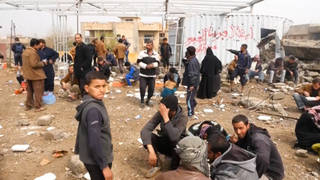"It Was a Crime": 15 Years After U.S. Invasion, Iraqis Still Face Trauma, Destruction & Violence

It was 15 years ago today when the U.S. invaded Iraq on the false pretense that Iraqi President Saddam Hussein was hiding weapons of mass destruction. The attack came despite worldwide protest and a lack of authorization from the United Nations Security Council. At around 5:30 a.m. in Baghdad on March 20, 2003, air raid sirens were heard as the U.S. invasion began. The fighting has yet to end, and the death toll may never be known. Conservative estimates put the Iraqi civilian death toll at 200,000. But some counts range as high as 2 million. In 2006, the British medical journal Lancet estimated 600,000 Iraqis died in just the first 40 months of the war. The U.S. has also lost about 4,500 soldiers in Iraq. Just last week, seven U.S. servicemembers died in a helicopter crash in western Iraq near the Syrian border. The war in Iraq has also destabilized much of the Middle East. Former United Nations Secretary-General Kofi Annan and others have directly blamed the U.S. invasion of Iraq for the rise of ISIS. We speak to the Iraqi-French sociologist Zahra Ali, who teaches at Rutgers University; Matt Howard, co-director of About Face: Veterans Against the War, the organization formerly known as Iraq Veterans Against the War; and Sami Rasouli, founder and director of the Muslim Peacemaker Teams in Iraq.